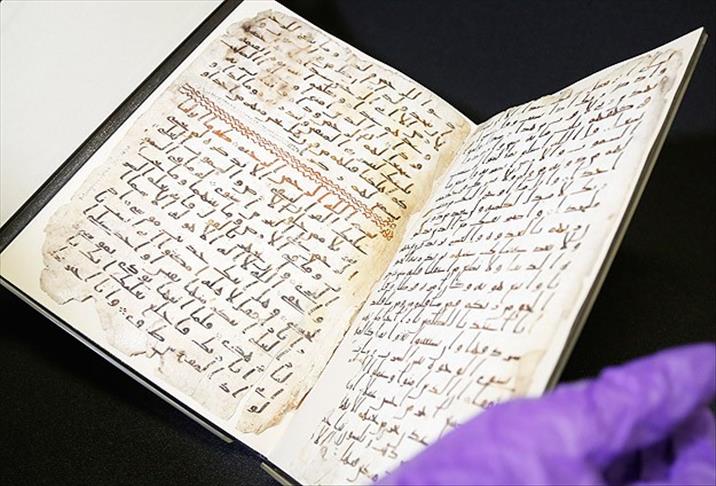
By Asli Aral / Yunus Kaymaz / Michael Daventry
LONDON
A British university that thrilled Muslims by announcing the discovery of a Quranic manuscript dating to the time of the Prophet Muhammad has raised the prospect of a Turkish exhibition.
The pages, which feature excerpts of three chapters from the Muslim holy text, rested unnoticed at University of Birmingham library until it was encountered during research by academic Alba Fedeli.
A radiocarbon analysis has revealed it is at least 1,370 years old, making it one of the oldest known examples of a Quranic text in existence.
Susan Worrall, the university’s Director of Special Collections, said the institution acquired the manuscript in the early 20th century during Iraqi historian Alphonse Mingana’s tour of the Middle East.
She told Anadolu Agency: “We’d always known this was a Quran, we’d always known it was early, but it had been bound -- probably in the 1930s -- with another Quranic fragment.
“It was Dr. Fedeli who was doing her research and she noticed by looking at the handwriting that they were actually two separate Qurans which had been put together.
“So, working with her, we separated the two out and then we commissioned some radiocarbon dating to look at the date of the actual parchment itself.”
That analysis found with a 95.4% probability that the manuscript dated to between the years 568CE and 645CE, placing it within the lifetimes of Muhammad and his first followers.
The document is written in Hijazi, one of the earliest forms of Arabic, on a parchment believed to be made from goat skin. It is in prime condition; much of the script clear and legible.
Among those permitted to see it before it goes on public display at an exhibition in October was Mohammad Talha Bokhari, an imam at Birmingham Central Mosque. He told Anadolu Agency that the manuscripts contain verses from three chapters, known as surah, including one which tells the story of Mary and Jesus.
He said: “All three surah we see are Makki surah, which mean these were revealed in Mecca. Therefore it could be believed that it was written before going to the Medina [the town where Prophet Muhammad migrated to avoid persecution from Meccan tribes]. So it becomes a very valuable thing that it was written in the time of the Prophet Muhammad.”
Mosque director Mohammad Ali felt the upcoming public exhibition was particularly significant because the manuscript displays the portions of the Koran that demonstrate Islam is the completion of a “chain of prophethood” extending from Adam through Abraham, Moses and Jesus to Muhammad.
“When I saw [the pages] the very first time there were tears in my eyes and I couldn’t believe I was in front of such a holy thing and I felt very much blessed and honored that I could see them with my naked eye,” Ali said.
The discovery made headline news across major British news outlets on Tuesday. It prompted worshippers at Birmingham Central Mosque to respond with a mixture of joy at the announcement and surprise that it was found in their own city, more than 5,000 km [3,100 miles] from Mecca.
One worshipper, Salim Malik, said: “I am little amazed to find that after so many years a piece of the Quran has been found in Birmingham. I wonder where it came from. It hasn’t been known for a very long time. If it’s roughly 1,400 years old, then where was it for so long -- surely not in Birmingham University?”
“I’m very excited. This Quran is a great discovery and I would like to see it as it’s been written long ago and it’d be a great experience for me to see,” added 12-year-old Abdurrahman as he left lunchtime prayers.
Birmingham is one of Britain’s most diverse cities, home to the some of the largest communities of Muslims, Hindus and Sikhs in the country. Islam is also one of the fastest-growing religions, with more than a fifth of residents -- 21.8% -- declaring they were Muslim in a population census four years ago.
Susan Worrell said this multicultural identity meant there was great enthusiasm in the city about the discovery: "I think it's a great source of global interest in Muslim heritage, but locally for the community here in Birmingham -- for the Muslim community and for all of the people in Birmingham -- it is a source of great pride."
The excerpts from the Quran will be put on public display at the Barber Institute of Fine Arts, on the University of Birmingham’s campus, from October 2 for three weeks.
The manuscript’s permanent home will be at the university, but could it travel around the world to reach non-British Muslims -- perhaps to Istanbul’s Topkapi Palace, where other Islamic relics are on display?
Worrell said she was open to the idea: “If Turkey asks us if they can have it on loan for exhibition we would be more than happy to consider that.”
Anadolu Agency website contains only a portion of the news stories offered to subscribers in the AA News Broadcasting System (HAS), and in summarized form. Please contact us for subscription options.

